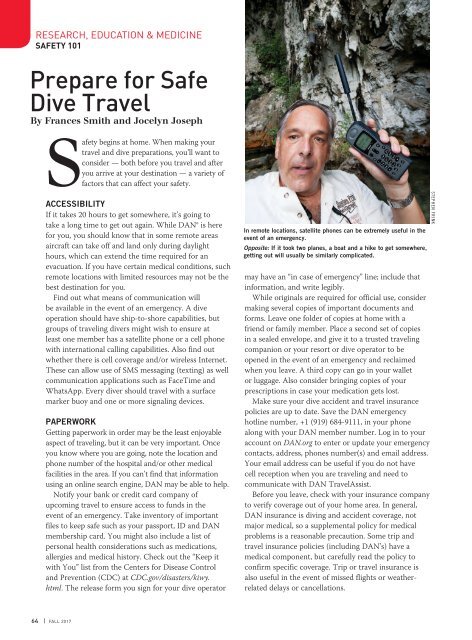AD 2017 Q4
Alert Diver is the dive industry’s leading publication. Featuring DAN’s core content of dive safety, research, education and medical information, each issue is a must-read reference, archived and shared by passionate scuba enthusiasts. In addition, Alert Diver showcases fascinating dive destinations and marine environmental topics through images from the world’s greatest underwater photographers and stories from the most experienced and eloquent dive journalists in the business.
Alert Diver is the dive industry’s leading publication. Featuring DAN’s core content of dive safety, research, education and medical information, each issue is a must-read reference, archived and shared by passionate scuba enthusiasts. In addition, Alert Diver showcases fascinating dive destinations and marine environmental topics through images from the world’s greatest underwater photographers and stories from the most experienced and eloquent dive journalists in the business.
Create successful ePaper yourself
Turn your PDF publications into a flip-book with our unique Google optimized e-Paper software.
RESEARCH, EDUCATION & MEDICINE<br />
SAFETY 101<br />
Prepare for Safe<br />
Dive Travel<br />
By Frances Smith and Jocelyn Joseph<br />
Safety begins at home. When making your<br />
travel and dive preparations, you’ll want to<br />
consider — both before you travel and after<br />
you arrive at your destination — a variety of<br />
factors that can affect your safety.<br />
ACCESSIBILITY<br />
If it takes 20 hours to get somewhere, it’s going to<br />
take a long time to get out again. While DAN® is here<br />
for you, you should know that in some remote areas<br />
aircraft can take off and land only during daylight<br />
hours, which can extend the time required for an<br />
evacuation. If you have certain medical conditions, such<br />
remote locations with limited resources may not be the<br />
best destination for you.<br />
Find out what means of communication will<br />
be available in the event of an emergency. A dive<br />
operation should have ship-to-shore capabilities, but<br />
groups of traveling divers might wish to ensure at<br />
least one member has a satellite phone or a cell phone<br />
with international calling capabilities. Also find out<br />
whether there is cell coverage and/or wireless Internet.<br />
These can allow use of SMS messaging (texting) as well<br />
communication applications such as FaceTime and<br />
WhatsApp. Every diver should travel with a surface<br />
marker buoy and one or more signaling devices.<br />
PAPERWORK<br />
Getting paperwork in order may be the least enjoyable<br />
aspect of traveling, but it can be very important. Once<br />
you know where you are going, note the location and<br />
phone number of the hospital and/or other medical<br />
facilities in the area. If you can’t find that information<br />
using an online search engine, DAN may be able to help.<br />
Notify your bank or credit card company of<br />
upcoming travel to ensure access to funds in the<br />
event of an emergency. Take inventory of important<br />
files to keep safe such as your passport, ID and DAN<br />
membership card. You might also include a list of<br />
personal health considerations such as medications,<br />
allergies and medical history. Check out the “Keep it<br />
with You” list from the Centers for Disease Control<br />
and Prevention (CDC) at CDC.gov/disasters/kiwy.<br />
html. The release form you sign for your dive operator<br />
In remote locations, satellite phones can be extremely useful in the<br />
event of an emergency.<br />
Opposite: If it took two planes, a boat and a hike to get somewhere,<br />
getting out will usually be similarly complicated.<br />
may have an “in case of emergency” line; include that<br />
information, and write legibly.<br />
While originals are required for official use, consider<br />
making several copies of important documents and<br />
forms. Leave one folder of copies at home with a<br />
friend or family member. Place a second set of copies<br />
in a sealed envelope, and give it to a trusted traveling<br />
companion or your resort or dive operator to be<br />
opened in the event of an emergency and reclaimed<br />
when you leave. A third copy can go in your wallet<br />
or luggage. Also consider bringing copies of your<br />
prescriptions in case your medication gets lost.<br />
Make sure your dive accident and travel insurance<br />
policies are up to date. Save the DAN emergency<br />
hotline number, +1 (919) 684-9111, in your phone<br />
along with your DAN member number. Log in to your<br />
account on DAN.org to enter or update your emergency<br />
contacts, address, phones number(s) and email address.<br />
Your email address can be useful if you do not have<br />
cell reception when you are traveling and need to<br />
communicate with DAN TravelAssist.<br />
Before you leave, check with your insurance company<br />
to verify coverage out of your home area. In general,<br />
DAN insurance is diving and accident coverage, not<br />
major medical, so a supplemental policy for medical<br />
problems is a reasonable precaution. Some trip and<br />
travel insurance policies (including DAN’s) have a<br />
medical component, but carefully read the policy to<br />
confirm specific coverage. Trip or travel insurance is<br />
also useful in the event of missed flights or weatherrelated<br />
delays or cancellations.<br />
STEPHEN FRINK<br />
64 | FALL <strong>2017</strong>









